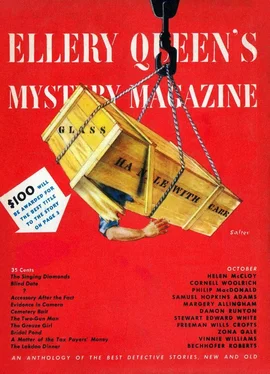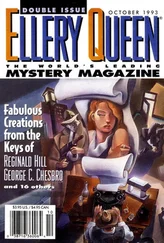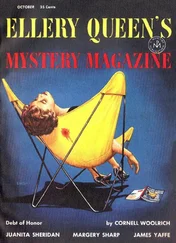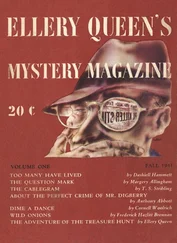Марджери Аллингем - Ellery Queen’s Mystery Magazine. Vol. 14, No. 71, October 1949
Здесь есть возможность читать онлайн «Марджери Аллингем - Ellery Queen’s Mystery Magazine. Vol. 14, No. 71, October 1949» весь текст электронной книги совершенно бесплатно (целиком полную версию без сокращений). В некоторых случаях можно слушать аудио, скачать через торрент в формате fb2 и присутствует краткое содержание. Город: New York, Год выпуска: 1949, Издательство: The American Mercury, Жанр: Классический детектив, на английском языке. Описание произведения, (предисловие) а так же отзывы посетителей доступны на портале библиотеки ЛибКат.
- Название:Ellery Queen’s Mystery Magazine. Vol. 14, No. 71, October 1949
- Автор:
- Издательство:The American Mercury
- Жанр:
- Год:1949
- Город:New York
- ISBN:нет данных
- Рейтинг книги:5 / 5. Голосов: 1
-
Избранное:Добавить в избранное
- Отзывы:
-
Ваша оценка:
- 100
- 1
- 2
- 3
- 4
- 5
Ellery Queen’s Mystery Magazine. Vol. 14, No. 71, October 1949: краткое содержание, описание и аннотация
Предлагаем к чтению аннотацию, описание, краткое содержание или предисловие (зависит от того, что написал сам автор книги «Ellery Queen’s Mystery Magazine. Vol. 14, No. 71, October 1949»). Если вы не нашли необходимую информацию о книге — напишите в комментариях, мы постараемся отыскать её.
Ellery Queen’s Mystery Magazine. Vol. 14, No. 71, October 1949 — читать онлайн бесплатно полную книгу (весь текст) целиком
Ниже представлен текст книги, разбитый по страницам. Система сохранения места последней прочитанной страницы, позволяет с удобством читать онлайн бесплатно книгу «Ellery Queen’s Mystery Magazine. Vol. 14, No. 71, October 1949», без необходимости каждый раз заново искать на чём Вы остановились. Поставьте закладку, и сможете в любой момент перейти на страницу, на которой закончили чтение.
Интервал:
Закладка:
She barred the window once more. She was not surprised. She knew now that she had known it always. She had pretended to herself that the thief would not come; but she was expecting him when he knocked. And he stood there, outside. Presently he would be inside.
He knocked yet again, this time more loudly. What need was there for silence when for miles and miles round there was no ear to hear save that of a chance prairie dog?
She laid hold upon her courage, seeing that it was her only refuge, and went to the door.
“Who is there?” she said through a chink.
A man’s voice, low and feeble, replied, “Let me in.”
“I cannot let you in.”
There was a short silence.
“I pray you let me in,” he said.
“I have told you I cannot. Who are you?”
“I am a soldier, wounded. I’m trying to get back to my friends.” He mentioned a settlement about fifty miles north. “I have missed my way, and I can’t drag myself any farther.”
Her heart swung violently between suspicion and compassion.
“I am alone in the house,” she said. “My husband is away, and he made me promise not to let anyone in during his absence.”
“Then I shall die on your doorstep,” said the voice. “I can’t drag myself any farther.”
There was another silence.
“It is beginning to snow,” he said.
“I know,” she said; and he heard the trouble in her voice.
“Open the door and look at me,” he said, “and see if I can do you any harm.”
She opened the door and stood on the threshold, barring the way. He was leaning against the doorpost with his head against it, as she had often seen her husband lean when he was talking to her on a summer evening. Something in his attitude, so like her husband’s, touched her strangely. Supposing he were in need, and pleaded for help in vain!
The man turned his face toward her. It was sunk and hollow, ravaged with pain, an evil-looking face. His right arm was in a sling under his tattered military cloak. He seemed to have made his final effort, and now stood staring dumbly at her.
“My husband will never forgive me,” she said with a sort of sob.
He said nothing more. He seemed at the last point of exhaustion. Through the dim white night a few flakes of snow fell upon his harsh, repellent face and on his bandaged arm.
A sudden wave of pity carried all before it.
She beckoned him into the house, and locked and barred the door. She put him in her husband’s chair by the fire. He hardly noticed anything. He seemed stupefied. He sat staring alternately at the fire and at her. When she asked him to what regiment he belonged he did not answer.
She set before him the supper she had prepared for herself, and chafed his hard, emaciated dirty hand till the warmth returned to it. Then he ate, with difficulty at first, then with slow voracity, all she had put before him.
A semblance of life returned gradually to him.
“I was pretty near done up when I knocked,” he said.
She dressed his wound, which did not appear very deep, wrapped it in fresh bandages, and readjusted his sling. He took it all as a matter of course.
She made up a little bed of rugs and blankets for him in the back kitchen. When she came back to the living room she found he had dragged himself to his feet, and was looking vacantly at a little picture of President Lincoln on the mantel-shelf. She showed him the bed and told him to lie down on it. He obeyed her implicitly, like a child. She left him, and presently heard him cast himself down. A few minutes later she went to the door and listened. His heavy, regular breathing told her he was asleep.
She went back to the kitchen and sat down by the fire.
Was he really asleep? Was it all feigned — the wound, the story, the exhaustion? Had she been trapped? Oh! what had she done?
She seemed like two people. One self, silent, alert, experienced, fearless, knew that she had allowed herself to be deluded in spite of being warned, knew that her feelings had been played upon, made use of, not even dexterously made use of; knew that she had disobeyed her husband, broken her solemn oath to him, plunged him with herself into disgrace if the money were stolen. And in the eyes of that self it was already stolen. It was still under the plank beneath her feet, but it was already stolen.
The other self, tremulous, inconsequent, full of irresistible tenderness for suffering and weakness even in its uncouthest garb, said incessantly:
“I could do no less. If I die for it, still I could do no less. Somebody brought him into the world. Some woman cried for joy and anguish when he was born. He would have died if I had not taken him in. I could do no less.”
Through the long hours she sat by the fire, unable to reconcile herself to going upstairs to her own room and to bed.
Once she got up and noiselessly took down her husband’s revolver from the mantel-shelf and examined it. He had taken its fellow with him, and apparently contrary to his custom he had taken the powder flask with him too, for it was gone from its nail. The revolvers were always kept loaded, but — by some evil chance the one that remained was unloaded. She could have sworn she had seen her husband load it two days ago. Why was this numbness creeping over her again? She got out powder and bullets from a small store she had of her own, loaded and primed it, and laid it on the table beside her.
The night had become very still. Her hearing seemed to reach out till she felt she could have heard a coyote move in its hole miles away. The log fire creaked and shifted. The tall clock in the corner ticked, catching its chain now and then, as its manner was. The wooden walls shrunk and groaned a little. The small home-like sounds only accentuated the enormous silence without. Suddenly in the midst of them a real sound fell upon her ear; very low but different, not like the fragmentary inadvertent murmur of the hut; a small, purposeful, stealthy sound, aware of itself. She listened as she had listened before, without moving. It was not louder than the whittling of a mouse behind the wainscot, hardly louder than the scraping of a mole’s thin hand in the soil. It continued. Then it stopped. It was only her foolish fancy, after all. There it was again. Where did it come from?
The man in the next room?
She took up the lamp and crept down the narrow passage to the door of the back kitchen. His loud, even breathing sounded distinctly through the crannies of the ill-fitting door. Surely it was overloud. She listened to it. She could hear nothing else. Was his breathing a pretense? She opened the door noiselessly, and went in, shading the light with her hand.
She bent over the sleeping man. At the first glance her heart sank, for he had not taken off his boots. But as she looked hard at him her suspicions died within her. He lay on his back, with his coarse, emaciated face toward her, his mouth open, showing his broken teeth. The sleep of utter exhaustion was upon him. She could have killed him as he lay. He was not acting. He was really asleep.
She crept out of the room again, leaving the door ajar, and went back to the kitchen.
Hardly had she sat down when she heard the sound again. It was too faint to reach her except when she was in the kitchen. She knew now where it came from — the door. Someone was picking the lock.
The instant the sleeping man was out of her sight she suspected him again.
Was he really asleep, after all? He had not taken off his boots. When she came back from making his bed she had found him standing by the mantel-shelf. Had he unloaded the pistol in her absence? Would he presently get up, and open the door to his confederates?
Her mind rose clear and cold and unflinching. She took up the pistol, and then laid it down again. She wanted a more noiseless weapon. She got out her husband’s great clasp-knife from the open tool box, took the lamp, and crept back to the man’s bedside. She should be able to kill him. Certainly she should be able to kill him; and then she should have the pistol for the other one.
Читать дальшеИнтервал:
Закладка:
Похожие книги на «Ellery Queen’s Mystery Magazine. Vol. 14, No. 71, October 1949»
Представляем Вашему вниманию похожие книги на «Ellery Queen’s Mystery Magazine. Vol. 14, No. 71, October 1949» списком для выбора. Мы отобрали схожую по названию и смыслу литературу в надежде предоставить читателям больше вариантов отыскать новые, интересные, ещё непрочитанные произведения.
Обсуждение, отзывы о книге «Ellery Queen’s Mystery Magazine. Vol. 14, No. 71, October 1949» и просто собственные мнения читателей. Оставьте ваши комментарии, напишите, что Вы думаете о произведении, его смысле или главных героях. Укажите что конкретно понравилось, а что нет, и почему Вы так считаете.












